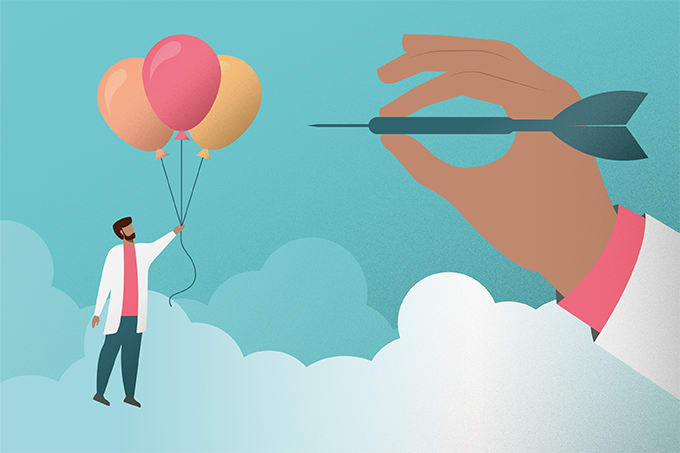
In his 2025 Power List essay, Alexander Böser described analytical science as the “unsung hero” of chemistry and pharma – essential to every breakthrough, yet too often dismissed as a cost center. His essay was named one of the top 10 responses to the question: What should be done to help analytical science rise to prominence as the keystone of all good science?
In this interview, Alex expands on that theme, arguing that robust analytical evidence is the foundation of innovation – particularly for start-ups seeking to prove the value of new materials, technologies, or platforms. He discusses why analytical scientists need to be involved earlier in R&D, how weak data practices can slow progress, and why digital skills and data stewardship are critical for the next generation of labs. Elevating analytical science, he suggests, is key to enabling faster, more reliable, and more ambitious innovation across the industry.
Please tell us about your background, organization, and your current role
I was born and raised in Germany and studied Chemical Biology at the Karlsruhe Institute of Technology (KIT), where I completed both my bachelor’s and master’s degrees. I briefly began a PhD in 2016 – the science was successful, with papers and a patent – but I realized academia wasn’t for me. I wanted to move into industry, which can be challenging as a chemist without a PhD, but I made it work.
I’ve now spent almost 10 years in industry. About half that time was in pharmaceutical labs and contract research organizations. It was eye-opening to see analytical sciences at a GMP level – quite a culture shock compared with university, where equipment most often just had to be “good enough.” In industry, if something isn’t documented, it hasn’t been done, and that rigor was refreshing to experience.
Four years ago, I joined 5-HT Chemistry & Health. In previous roles, I had been Head of Laboratory and Key Account Manager, combining hands-on science with people management. At 5-HT, though, we don’t have a lab – we’re mostly a consulting agency focused on chemistry, pharma, and healthcare. Our roots lie in the German Federal Ministry for Economic Affairs’ Digital Hub (de.hub) initiative, which established 12 hubs across Germany in areas like AI, cybersecurity, and logistics. Our hub, based in Ludwigshafen – home to BASF – was dedicated to chemistry and health.
Our initial mission was to drive and foster digitalization and innovation in chemistry and health, especially in Germany. Over the years, we pivoted from a mostly altruistic business model secured by public funding to a more customer-centric business model. Today we primarily support chemical and pharmaceutical companies through technology and innovation scouting. A partner comes to us with a challenge or innovation need, and we identify the right technology providers – often startups – to address it. Over the years, we have also built our own international innovation ecosystem with partners in Europe, the US, and Japan. The only region we’re not yet active in is Africa, where the chemical sector is still relatively small.
At 5-HT, I’m responsible for the chemistry side of our work. We soon realized that before labs can digitalize, they often need other innovations first – new materials, new catalysts, and other analog advances that make automation or data-driven research possible. So we work across both digital and non-digital fronts. Alongside technology scouting, we also host events – both our own and for customers – all centered on innovation and digitalization in chemistry and health.
If a startup comes to you with big claims but without analytical data to back them up, what’s your next step?
It depends on the application area. If the company I’m working with is open to collaborative R&D, then there’s more leeway – the startup doesn’t need to have everything figured out yet. They can develop the sophisticated R&D together with the partner, side by side.
But in other cases – for example, novel materials – most companies simply want to broaden their portfolio. They don’t want to do the analytical work themselves to prove the material’s properties. If a startup comes to me with, say, a new polymer produced by bacteria or fungi that could replace Styrofoam for insulation, my first question is: what are the properties? What’s the thermal insulation coefficient – the same as Styrofoam, better, or worse? Would I need more or less material to achieve the same performance?
If they can’t provide that kind of data, sometimes I can wait, sometimes I can’t – it depends on the partner. In some cases, it means they’re out, but I’ll tell them they can come back once they have the data. In other cases, I might point them towards collaboration. Here in Germany, for example, there are many opportunities with Fraunhofer Institutes, which are very open to collaborative science projects.
But one lesson stands out from years of working with startups and technology providers: always ask for analytical evidence. Without it, the claims just don’t hold.
Do you think this lack of analytical data is inevitable when you’re dealing with people who aren’t analytical chemists – or is there perhaps a slight underappreciation for its importance?
I don’t think it’s a lack of appreciation, especially with startups. Most of the time it’s “talk first, proof later.” They want to generate interest – if 30 potential customers test their material and 10 like it, and then five or seven continue, that’s still a win. That’s simply part of how they do business. And because their R&D cycles move so quickly, the data they have today may look different in just a month or two.
On the company side, I often speak with non-scientists – finance or salespeople, for example. For them, it’s all about ROI, time saved, or the amount of chemicals saved. They don’t necessarily need to understand the science, which is fine – but I’ll still ask for evidence. If someone tells me, “Our software reduces catalyst development time by 40 percent,” my question is: do you have a case study with a partner to prove that, or is it just a statistical estimate?
I use the same mindset we have as scientists – always ask for evidence, whether it’s analytical data or business proof points.
In your essay you mentioned that you’d like to see analytical scientists involved in R&D projects at an earlier stage – even leading some of those teams. Were you thinking more about start-ups, pharma, or both?
I think there’s a case for both. With start-ups, it’s interesting because many chemistry and pharma companies are founded by scientists – often building on their PhD or postdoc research. Sometimes that’s a genuinely strong idea to grow into a business, and sometimes it’s more about continuing a project they don’t want to abandon. In both cases, you already have a scientist sitting at the strategic table from day one.
On the corporate side, it’s a bit different. From my own R&D experience, it can be tempting to pursue a moonshot project without considering how you’ll analyze the results – just to see what happens. But very quickly, you face the question: how do I actually prove this? If you’re synthesizing a new polymer, for example, you need specific instruments and data – say, mass spectra – to confirm what you’ve made.
If that access isn’t available in-house, you have to outsource, which means extra cost, extra time, and new collaborations. Sometimes the feasibility of an entire research project hinges on whether you can secure that analytical evidence. Even if the chemistry is inexpensive and you can generate thousands of compounds, without the ability to screen and characterize them properly, the R&D won’t move forward.
That’s why I argued in my essay that analytical considerations need to come in early. Otherwise, you risk running into roadblocks that could have been anticipated – and the whole project may not be feasible from the start.
How do you see the perception of analytical science among others in R&D – in the chemical industry or pharma?
In my opinion, the perception is not very good. Most of the time, analytical science is seen as something that just costs money – a necessary step you have to take, rather than a positive driver in itself. Analytical instruments are very expensive, both in terms of CapEx and OpEx. You need trained staff, ongoing servicing, and in regulated industries like pharma, you also face lengthy qualification and validation processes before you can even run a single analysis.
So the perception often becomes: it’s cumbersome, it’s expensive, and it only confirms what we already knew. It’s treated as a must-have rather than something to be valued. But I think this mindset needs to shift. Without analytical evidence, you simply can’t do R&D. In my own experience at CROs, analytical evidence was the core of the business – everything else, from management to operations, was secondary.
The same is true in academia: without analytical evidence, you can’t publish papers or secure funding. It’s fundamental to everything we do as scientists. Yet it’s perceived negatively, which is strange – I can’t think of another discipline where something so central is so underappreciated.
Do you think part of the problem is that people don’t appreciate how much analytical innovation underpins what’s possible today?
Exactly. With each advance in analytical science, we can ask and answer new questions. Sensitivity improves, and suddenly you’re able to see things that were invisible before. But people often take that for granted – they benefit from the innovation without realizing how recently it became possible.
And analysis today isn’t just about putting a sample into an instrument. Increasingly, it’s also digital – data science, machine learning, Bayesian optimisation, design-of-experiments approaches. These methods aren’t new in principle, but they’ve become much more accessible and powerful in recent years. Ten years ago, when I was a master’s student, the people doing computational chemistry were seen as the “geeks” working on things most chemists considered too abstract. Now, those same people are ahead of the curve, because digitalisation has become central.
Today, many companies are looking for scientists who can combine experimental work with digital analysis. Programming skills and computational literacy are becoming part of the standard toolkit. And perhaps this rising appreciation of digital analysis will also boost recognition of the physical analytical sciences – the instruments, the measurements – because both are essential, and both are advancing rapidly.
As a closing thought – whether in the context of start-ups or larger organisations – do you have any advice you’d give from an analytical science perspective?
Yes. One point I’m very focused on right now is that the importance of analytical science – and especially the digital side of it – isn’t being taught well enough to newcomers. In Germany, for example, you can’t work in a lab without a qualification, either from university or an apprenticeship. But even then, analytical science is usually taught as a means to an end – something you need because you’ll be running instruments like HPLCs or GCs every day.
What’s often missing is an appreciation of analytical science as a discipline in its own right, along with the digital and data skills that come with it. Topics such as statistics, digital data analysis, design of experiments, and good data stewardship aren’t covered in enough depth. Yet when newcomers enter companies, they’re confronted with weak data governance – files saved in Excel, SOPs in Word documents – despite all the QA and QC processes in place.
If we train young scientists and technicians to value good data stewardship from the start, they’ll create demand within companies for better systems. That will push organizations to modernize and deal with their technological debt. Because the reality is, younger generations raised on digital tools won’t want to spend their careers in front of 40-year-old instruments with minimal connectivity.
So my advice is this: we need to do more to prepare newcomers, both in technical training and in their appreciation for data governance. That will not only improve companies but also elevate the role of analytical science itself.




